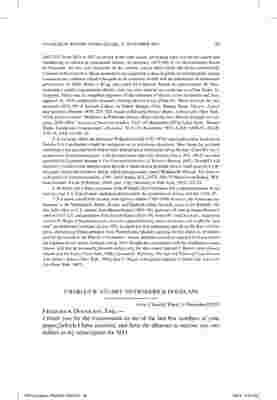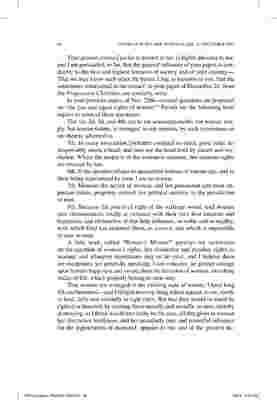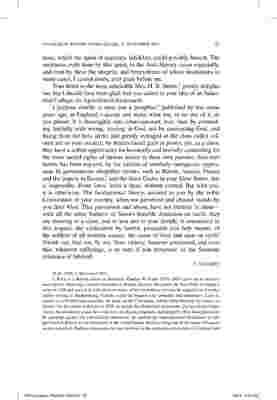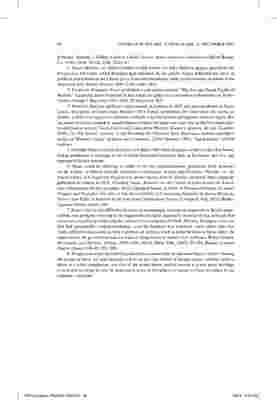Pages
1
CHARLES W. STUART1Born to a British officer in Bermuda Charles W. Stuart (1781-1865) grew up on military posts before receiving a formal education in Belfast, Ireland. He joined the East India Company’s army in 1798 and served in it for thirteen years. After his military service, he migrated to America before settling in Amherstburg, Canada, where he became a lay preacher and missionary. Later licensed as a Presbyterian preacher, he drew on his Calvinistic beliefs when forming his stance on slavery. On his return to Britain in 1829, he joined the abolitionist movement. During his participation in the antislavery cause, he wrote over two dozen pamphlets, including The West Indian Question. In agitating against the colonization movement, he applied the organizational techniques he had perfected in Britain to the movement in the United States. Besides being one of the major influences on the American abolition movement, he was involved in the temperance movement in England and Scotland. Anthony J. Barker, Captain Charles Stuart: Anglo-American Abolitionist (Baton Rouge, La., 1986); DAB, 18-162; ANB, 21:65-67. TO FREDERICK DOUGLASS
Lora, C.[anada] W.[est] 31 December [1853.]
FREDERICK DOUGLASS, ESQ.:—
I thank you for the transmission to me of the last few numbers of your paper,[ ]which I have received, and have the pleasure to enclose you two dollars as my subscription for 1854.
2
Your general course,[]as far as known to me, 1s highly pleasing to me, and I am persuaded, so far, that the general influence of your paper, is conducive to the best and highest interests of society and of your country.—That we may know each other the better, I beg to mention to you, that the sentiments entertained in the extract2Stuart identifies an untitled article he had written for Adin Ballou’s utopian periodical the Progressive Christian, which Douglass had reprinted. In the article, Stuart defended the views of political abolitionists in the Liberty party from editorial attacks made by Garrisonian members of the American Anti-Slavery Society. FDP, 2 December 1853. in your paper of December 2d, from the Progressive Christian, are cordially mine.
In your previous paper, of Nov. 25th—several questions are proposed on “the just and equal rights of women."3Frederick Douglass’ Paper published a call notice entitled “The Just and Equal Rights of Women,” requesting those interested in that subject to gather at a convention in Rochester on 30 November through 1 December 1853. FDP, 25 November 1853. Permit me the following brief replies to some of these questions:
The Ist, 2d, 3d, and 4th, are to me unexceptionable; not women simply, but human nature, is wronged, in my opinion, by such expressions as are therein adverted to.
5th. In every association,[]whether conjugal or other, good order indespensably needs a head; and men are the head both by nature and revelation. Where the property of the woman is separate, her separate rights are secured by law.
6th. If the question relates to unmarried women of mature age, and to their being represented by men, I see no reason.
7th. Measure the nature of woman, and her paramount and most important duties, propriety commit her political security, to the jurisdiction of men.
9th. Because the practical right of the suffrage would lead woman into circumstances totally at variance with their own best interests and happiness, and obstructive of that holy influence, so noble and so mighty, with which God has endowed them, as women, and which is impossible to man as men.
A little work, called “Woman’s Mission"4Woman’s Mission, published anonymously in London in 1839 and later attributed to Sarah Lewis, was based on Louis-Amié Martin’s 1834 French publication De l'éducation des mères de famille. Lewis’s text argues for distinctly domestic roles for women and opposes women’s rights. Her argument to restrict women to moral influence within the home was a key text in the Victorian effort to spiritualize women. Sarah Lewis and Louis-Aimé Martin, Woman’s Mission, 4th ed. (London, 1839), 12, 152; Janet L. Larson, “Lady-Wrestling for Victorian Soul: Discourse, Gender, and Spirituality in Women’s Texts,” Religion and Literature, 23:44 (Autumn 1991); “Sarah Lewis,” ODNB (online). portrays my sentiments on the question of woman’s rights; her distinctive and peculiar rights as woman; and whatever exemptions may or do exist, and I believe there are exceptions; yet generally speaking, I can conceive, no greater outrage upon human happiness and virtue, than the intrusion of woman, into these walks of life, which properly belong to men only.
That women are wronged in the existing state of society, I have long felt and lamented—and I delight in every thing which appear, to me, surely to lend, fully and cordially to right them. But that they would or could be righted or honored, by treating them morally and socially, as men, thereby destroying, as I think would inevitably be the case, all that gives to woman her distinctive loveliness, and her peculiarly pure and powerful influence for the regeneration of mankind, appears to me, one of the greatest fictions, which the spirit of dogmatic infidelity, could possibly broach. The enormous evils done by this spirit, to the Anti-Slavery cause especially, and even by these the integrity and benevolence of whose institutions in many cases, I cannot doubt, ever glare before me.
3
Your letter to the most admirable Mrs. H. B. Stowe,5Probably Stuart refers to the letter of 8 March 1853 from Douglass to Harriet Beecher Stowe, widely publicized at the time of the Colored National Convention held in Rochester that July and reproduced in this volume. greatly delights me; but I should have been glad, had you added to your idea of an Industrial College, an Agricultural department.
I purpose shortly to send you a pamphlet,6Stuart could be referring to either of his two anticolonization pamphlets. Both Remarks on the Colony of Liberia and the American Colonization Society and Prejudice Vincible; or, the Practicability of Conquering Prejudice by Better Means than by Slavery and Exile were originally published in London in 1832. C[harles] Stuart, Remarks on the Colony of Liberia and the American Colonization Society (London, 1832); C[harles] Stuart, A Letter to Thomas Clarkson, by James Cropper and Prejudice Vincible; or The Practicability of Conquering Prejudice by Better Means by Slavery and Exile; in Relation to the American Colonization Society (Liverpool, Eng., 1832); Barker, Captain Charles Stuart, 314. published by me, some years ago, in England,—accept and make what use, or no use of it, as you please. It is thoroughly anti-colonizationist; man rises by contending lawfully with wrong, trusting in God; not by mistrusting God, and flying from the holy strife; and greatly outraged as the class called colored are in your country, by brazen-faced guilt in power, yet, as a class, they have a nobler opportunity for heroically and lawfully contending for the most sacred rights of human nature in their own persons, than ever before has been enjoyed, by the victims of similarly outrageous oppression. In governments altogether tyrants, such as Russia, Austria, France and the popery in Europe,7Stuart, who by the 1850s had become an increasingly enthusiastic supporter of British imperialism, was probably referring to the suppression of rights (especially those involving suffrage) that occurred across Europe following the failure of the revolutions of 1848. The only European countries that had successfully avoided revolution—and the backlash that followed—were either ones that made sufficient concessions in time to prevent an uprising (such as Great Britain) or those where the opposition to the government was too weak or insignificant to matter, such as Russia. Robert Gildea, Barricades and Borders: Europe 1800-1914, 3d ed. (New York, 2003), 83-104; Barker, Captain Charles Stuart, 138-89, 263, 289. and the Slave Codes in your Slave States, this is impossible. Brute force, lords it there, without control. But with you, it is otherwise. The fundamental liberty, secured to you by the noble Constitution of your country, when not perverted and abused, stands by you thro’ God. That perversion and abuse, have not eternity in them—with all the other features of Satan’s horrible dominion on earth; they are drawing to a close, and to you and to your people, is committed in this respect, the vindication by lawful, peaceable and holy means, of the noblest of all modern causes; the cause of God and man on earth! Shrink not, fear not, fly not. Your victory, however protracted, and even this, whatever sufferings, is as sure, if you persevere, as the Supreme existence of Jehovah.
C. STUART.8Douglass inserted the following editorial comment after he reprinted Stuart’s letter: “Among the names of those we early learned to love, as the true friends of human nature, whether under a black or a white complexion, was that of the writer above; and we esteem it a very great privilege to welcome anything he may be disposed to write on the subject of human welfare, to a place in our columns.—EDITOR.”
PLSr: FDP, 31 December 1853.



